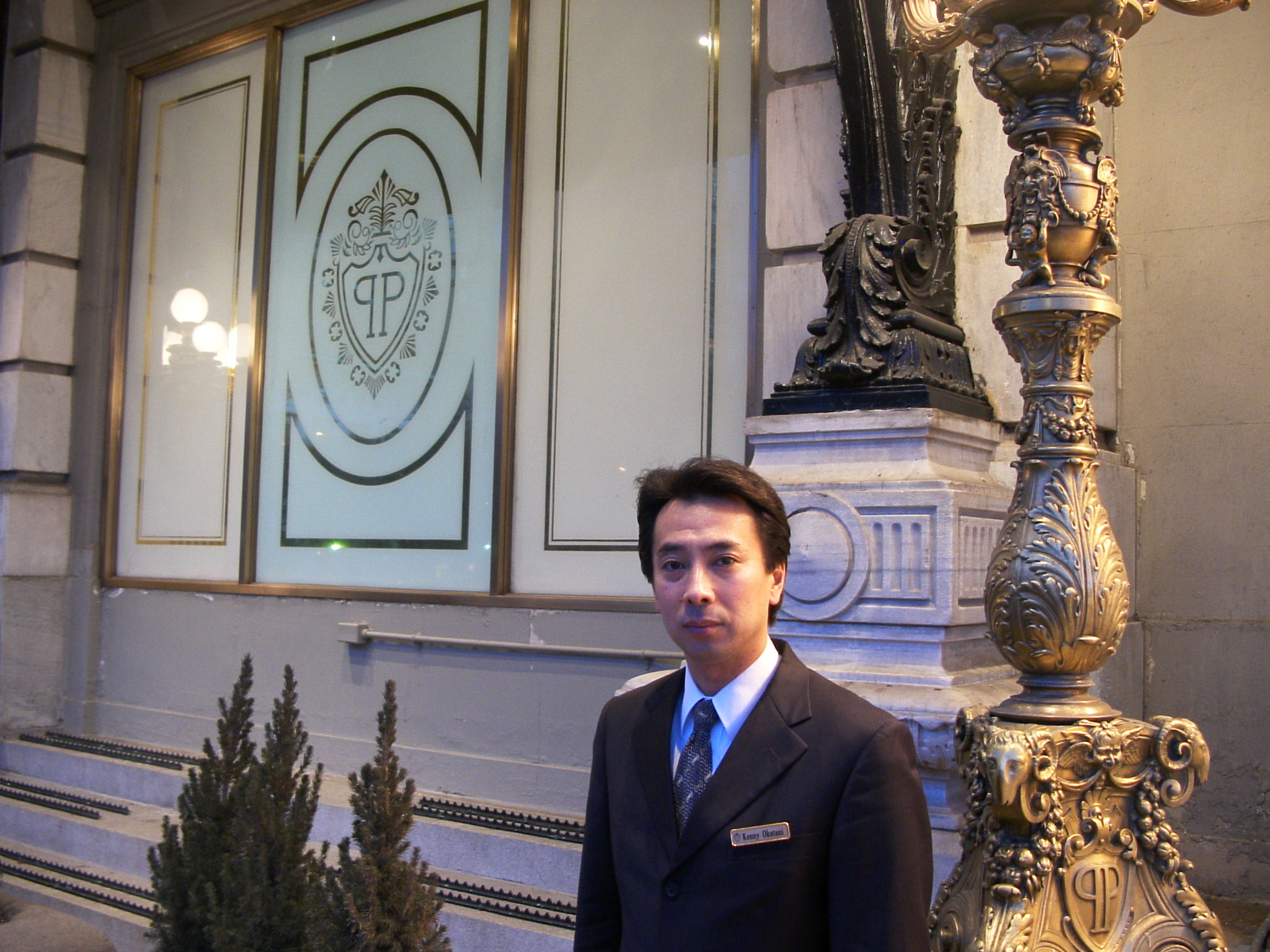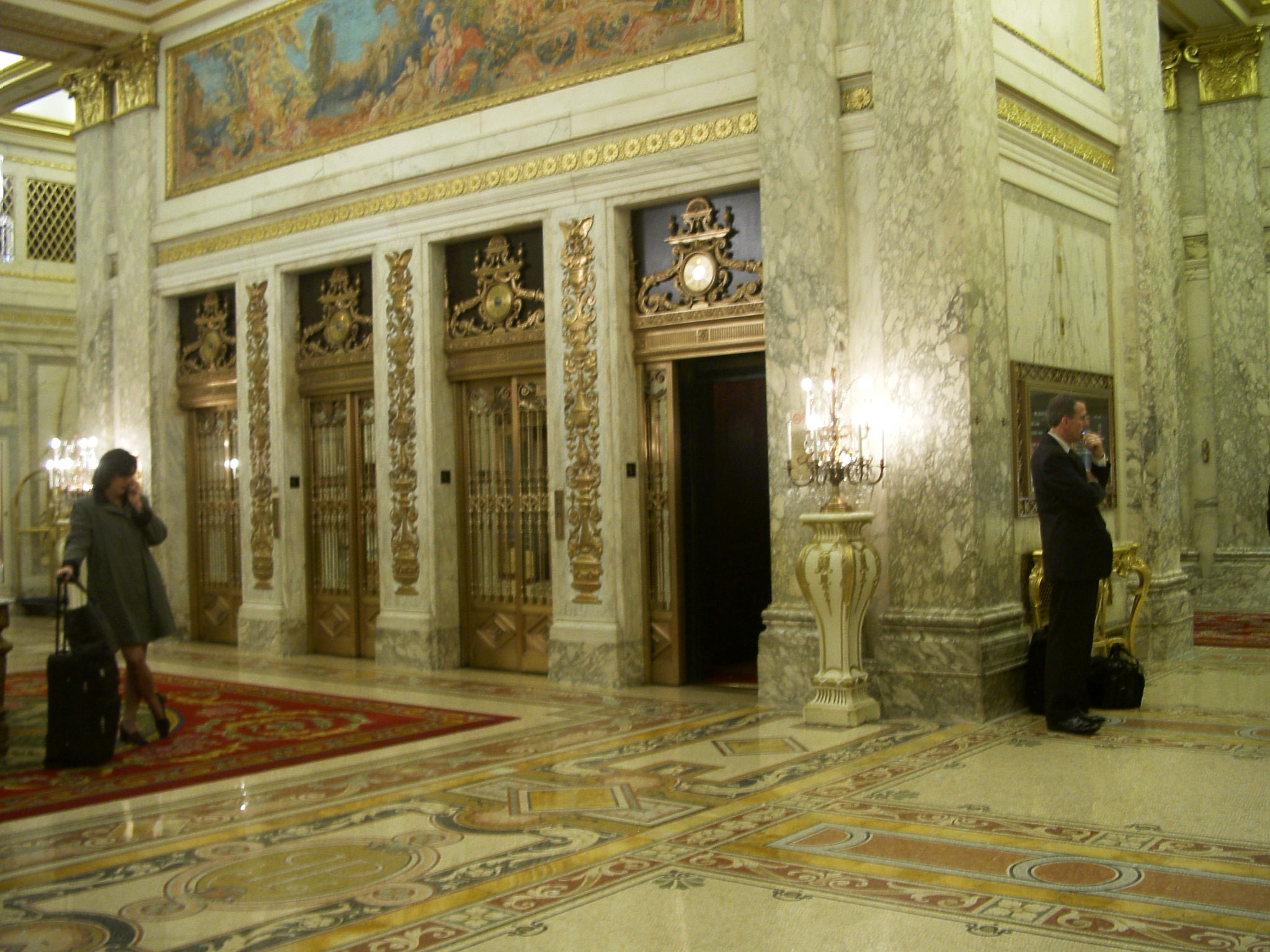This is a reprint of the article that was published in Daily Yomiuri on June 11, 2005.
Wataru Doi Special to The Daily Yomiuri
One evening in early April, Keisuke Okutani sat down at a cafe located on the ground floor of the Plaza, a hotel treasured by New Yorkers. Okutani, who has worked for 10 years at the Plaza, expressed concern over the future of the hotel, which was due to undergo a remodeling that would see many of its rooms sold off as condominiums.
Okutani began by recounting some of his happier memories.
"Muhammad Ali was a frequent guest and Keanu Reeves stayed here recently. Henry Kissinger has a favorite seat here and Al Pacino lives nearby and often drops by this very cafe," he said. "Many films have been shot here. One of the oldest is Alfred Hitchcock's North by Northwest. No other hotel has appeared in so many films."
The fabled Plaza has also been a prize billionaires have battled for. Donald Trump famously bought the hotel but had difficulties with the city of New York over the control of it.
For many Japanese, the hotel is famous as the place where the Plaza Accord on monetary policy was signed in 1985 by the finance ministers of the world's five biggest economies including Japan.
Clearly, throughout its history, the Plaza's role has been more than just a luxury hotel. Certainly, for Okutani, who was the hotel's sales director for Far Eastern customers, the Plaza has meant much more.
Right from the start of Okutani's career in the hotel industry he wanted to work at the Plaza and has ended up devoting his career to the hotel, which he immediately fell in love with.
"I joined Westin's Tokyo office [after graduating from college] even though it did not operate any hotels in Japan [at the time]. The reason I joined was because Westin owned the Plaza," he said.
Okutani argues that unlike in the United States there are many grand hotels in Europe.
"In the United States, the Plaza is probably the only grand hotel. There were many prestigious hotels in this country, but the Plaza's existence has always been outstanding. More than a hotel, it has been a symbol of envy," he said.
After spending 10 years in Tokyo, Singapore, and Saipan, Okutani finally started working at his beloved hotel. Many Japanese had worked there before him and dreamed of success at one of the world's most prestigious hotels. But usually they failed to last more than a few months. Okutani said pride was the key to working at the Plaza.
"Plaza employees must always show great pride in the hotel. Those who aren't proud to work here end up having to leave," he said.
Photos by Wataru Doi
The lobby of the framed Plaza Hotel in New York.

Okutani at the entrance of the Plaza
The Plaza opened its doors on Oct. 1, 1907. Located at Fifth Avenue and Central Park South, it was built to be one of the most elegant hotels in the world. The Plaza originally served primarily as a residence for wealthy New Yorkers. At that time, the gap between rich and poor was very wide and the hotel was a place for rich people to socialize. As the country flourished and people's incomes rose, the general public also started coming to the Plaza.
But as the hotel attracted a more general clientele, its atmosphere also changed.
"A hotel's atmosphere is created by its customers. Unfortunately, the Plaza has lost some of its good, old atmosphere. Longtime regular guests stopped coming to the hotel and, instead, sightseers started coming. I really don't know if this has been good or not for the Plaza," Okutani said.
While Plaza employees all demonstrate the high standards of service, behavior and manners that the hotel is so proud of, they also expect certain qualities in their customers to maintain the atmosphere of the hotel.
"Like people long to own a Mercedes, hotel workers always have an ambition to work at a luxury hotel. They want to be proud of working in a prestigious environment, but at the same time they believe the type of clientele must match the standards of the hotel," he said.
High standards do not necessarily equate to large wallets. It is more a question of appearance, behavior, or manner. Unfortunately, Japanese guests have sometimes disappointed Okutani due to their ignorance of what it means to stay at a "grand" hotel, and for a lack of understanding of the cultural differences among Westerners and Japanese.
A typical problem associated with Japanese guests is tipping.
"A Japanese family called the bell desk and asked for a porter," Okutani explained, giving an example. "But the porters were reluctant to help them because they know that Japanese guests rarely pay a suitable amount for a tip. I told one of them to attend to the family, but he then demanded a guarantee that he would be tipped sufficiently. Even though I knew the family probably wouldn't tip him adequately, I promised him he would get a tip. As expected, though, the family didn't give him anything, so I ended up having to give him a 10 dollars bill."
Okutani said Japanese guests needed to learn more about the manners and behavior deemed suitable in such a hotel. He pointed out that a porter's income depends on tips. In contrast, housekeepers get enough salary without tips. Restaurant waiters, though, are in the same situation as porters.
"Those who deal face-to-face with customers need tipping. If a concierge tells you about a good restaurant, you should tip him," Okutani said. "Usually tips are paid after a service has been provided, but the word tip actually stands for "to insure promptness." Okutani says in grand hotels porters expect to receive 3 dollars to help each person. According to this rule of thumb, a family of four people should pay 12 dollars.
Okutani also encountered another problem.
"Japanese believe the customer is king and allowed to do anything. In the United States, everyone is more or less equal. This applies to the relationships between customers and hotel employees, too. Even if they are rich, the Plaza does not want customers who have an attitude of superiority," he said.
Okutani says the Plaza's employees can easily judge a customer's character even if they just drop by the hotel for coffee. "We can tell whether they are the right kind of lady and gentleman just by looking at their appearance, their clothes and accessories and even more importantly by their manners and behavior," he said.
When the Plaza reopens in 2007, it will celebrate its 100th anniversary. In the meantime, the large-scale renovation planned by the owner Elad Properties involves converting many of the rooms into condominiums and renting out space to new stores.
New Yorkers and Mayor Michael Bloomberg are strongly opposed to the plan, though. This opposition has forced the plans to be altered, saving many of the rooms, a restaurant, a cafe and a ballroom. "It proves that money can't buy everything," Okutani said.
Though Okutani said he, too, had opposed the plans, he is now helping the Plaza sell its rooms.
"About 150 rooms will be sold as condominiums. Prices will range from 5 million dollars to 40 million dollars. But I want to sell the rooms to investors, because they will not live in them and instead will lend them out to visitors. One Japanese guest has already expressed interest in purchasing a room," he said.
One of Okutani's most memorable experiences at the Plaza was former Prime Minister Noboru Takeshita's visit in 1995. Takeshita visited to celebrate the 10-year anniversary of the Plaza Accord.
"It was funny because nobody at the hotel could recall where the accord was signed," he said. "I asked the [former] prime minister where it was done, and he answered that it had been done in the White and Gold Room."
Though Okutani believed he would work at the Plaza until the end of his career, he is now not sure about employment at the new Plaza. After renovation, it will have only 350 hotel rooms and the room rate will be higher than in the past. His employment will depend on the strength of demand from the hotel's Asian clientele.
So Okutani is now starting to think about another dream.
"I've been in the hotel industry for 20 years and developed a personal philosophy of the hotel service and guest behavior. My dream is to run a hotel as general manager some time," he said.
(This article was written and posted on June 11, 2005)
